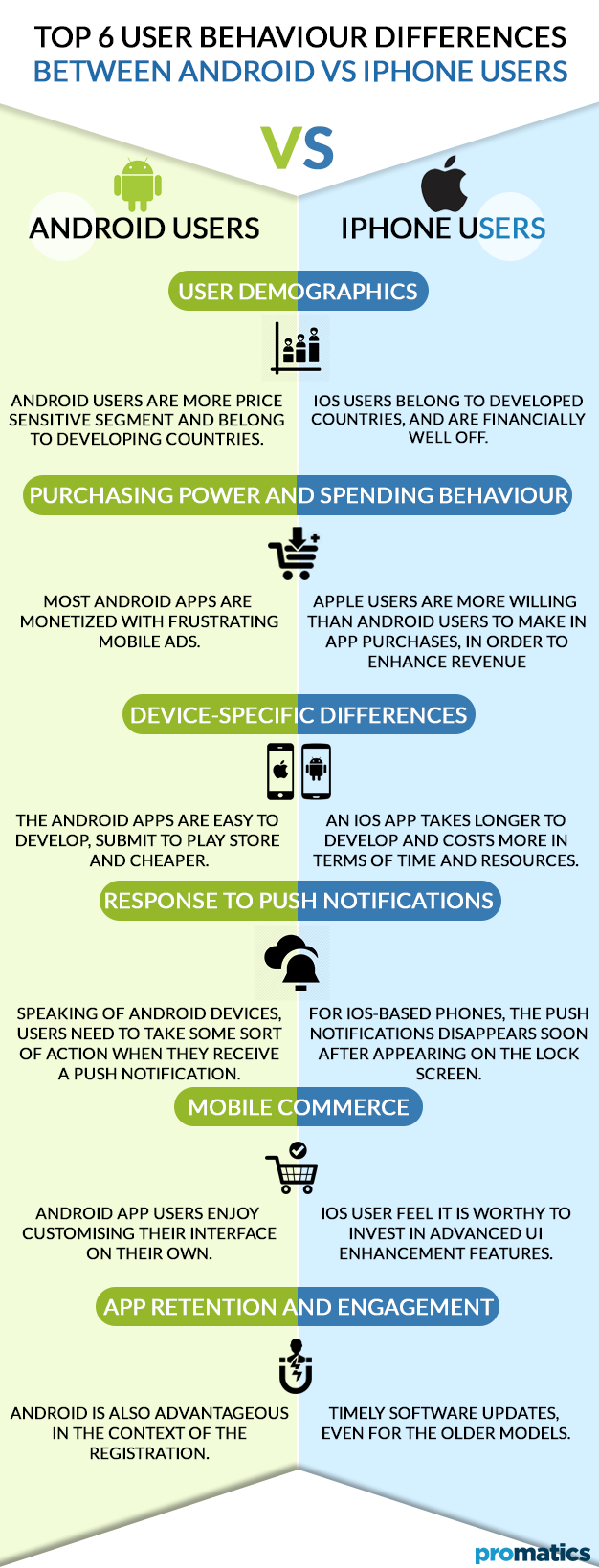iPhone vs Android Users: How remarkably different they are from each other
The popularity of smartphones is on the rise since their inception in 1992. The number of smartphone users is set to grow from 2.1 billion in 2016 to around 2.5 billion in 2019. Mobile apps form an integral part of the smartphone ecosystem which facilitates various important functions for users. The average smartphone user currently spends about three hours per day interacting with mobile apps. The time is ripe for businesses who intend serve their customers better for entering the mobile apps market.
However, before approaching any mobile app development companies to outsource the app development exercise, it is best to analyze the behaviour of your target user. Any app is a success when it is crafted after considering preferences of the target user segment and is adept at solving their problems effectively. A simple factor like user’s choice of the smartphone they use; tells a lot about their preferences. It can help you draw inferences about user’s concern over pricing, interest in downloading, take on in-app purchases and loyalty towards brands. A mobile app development company that stresses on building an understanding about the target population; delivers apps that make the cut right away. It is crucial for mobile app development companies to have an in depth understanding of how user behavior changes between OSs. Thus, identifying the user segment allows an informed decision about the choice of the OS platform for mobile apps development.
Mobile Operating System Market Share Worldwide was 74.85% and 22.94% for Android and iOS respectively, in April 2019. While both OSs offer identical functionalities, they are directed towards completely different consumer segments. Here are some general trends that represent stark differences between Android and iOS phone users, which greatly affect the nature of mobile app development for businesses:
I. User Demographics
User demographics like location, age group, income strata and educational background determine the choice of smartphone(OS device) a user makes. Knowledge of demographics can help an app business estimate the commitment activities like in-application buys and app-membership subscription for their target user segment. Most iOS users belong to developed countries, have higher education degrees and are financially well off. Android users on the other hand are comparatively a more price sensitive segment with average educational background. Conclusively, a large segment of Android users belong to developing countries of the world. Affordable pricing paired with engaging user experience makes Android a more popular choice than iOS. Mobile app businesses trying to capture the largest market share must opt for Android platform.
II. Purchasing Power and Spending Behaviour
As discussed in the previous point, Apple customers belong to a financially well-off segment of the society when compared to Android. However, the apps for the Android platform are more frequently downloaded and reach a wide customer base. The app revenues from iOS devices far exceed those from Android devices. Apple users are more willing than Android users to make in app purchases, in order to enhance revenue Thus, most Android apps are monetized with frustrating mobile ads. Because Apple phones depend on app purchases for the revenue, an app business directed towards revenues must be based on iOS. An app to target masses should be based on Android.
III. Device-specific Differences
Device capabilities differ significantly for iOS and Android devices, significantly affecting the user experience. Apple has in place a strict set of UI guidelines for its apps with a stringent scrutiny procedures in place. This iOS apps are developed with greater attention to detail to ensure they pass Apple app store verification. They are consistent and easy to use when compared to Android apps. The Android apps are easy to develop, submit to Play store and cheaper. They also offer a range of customization option for users. An iOS app takes longer to develop and costs more in terms of time and resources.
IV. Response to Push Notifications
The way smartphone users react to push notifications differs for Android and iOS devices. 3.5% of Android consumers will opt for opening their push notifications, contrary to the 1.8% of Apple consumers who do the same. This difference in preference results from differences in the design principles of their user interface. Tracking push notification open rates helps a business benchmark their open rates better based on the device being used. Speaking of Android devices, users need to take some sort of action when they receive a push notification. For iOS-based phones, the push notifications disappears soon after appearing on the lock screen. This significantly reduces the number of users that open them. It only takes an average of 7 minutes for an iOS user to respond to a push notification, compared to 48 minutes for an Android push notification. Thus, an app which expects higher engagement rate fares well on Apple.
V. Mobile Commerce
iOS apps incur more spending from users and bring better ROIs. Apple users typically have higher income and relish extra convenience. They are okay with the concept of paying for shopping through mobile commerce platforms. iOS user feel it is worthy to invest in advanced UI enhancement features. An app that brings in returns through in-app purchases is likely to do better when developed for iOS platform. Retail and other app businesses that seek to monetize their app through paid versions and in-app purchases do well when they adopt iOS platform. Android app users enjoy customising their interface on their own. This type of creative freedom is appreciated by Android device users.
VI. App Retention and Engagement
The device usage and content engagement vary significantly for both Android and iOS devices. Apple devices promise better engagement rates than Android counterparts. Timely software updates, even for the older models, and good life makes it a user favourite in terms of utility and value for money. iOS will continue to eat into Android’s current market share throughout 2019. On the other hand, Android devices have a greater number of media users and a larger audience. Android is also advantageous in the context of the registration, since it is easy when compared with that of iOS.
As a mobile app business you need to choose if you are working towards generating high revenues or whether you are looking for the user engagement for the longer run. Configuring the goals of an app is the foremost step when deciding which platform to choose to build it. Is the volume of users the main identifier of success for your app, or you are just focused on driving engagement? Choosing the right platform depends on the goals you’re trying to achieve and the monetisation strategy you have in place.
While there are numerous functionalities that remain identical in both Android and iOS apps, the user experience they offer varies significantly. This results in different consumer behaviour for both platforms. Aforementioned comparison between Android vs iOS users are intended to throw light on a specific platforms and their potential to help you with mobile app development. The ideal case scenario is to build apps for both these platforms to capture the majority market, these factors help you decide which platform to choose case you are developing for a single platform. Promatics Technologies has a team of best mobile app developers to help you decide which platform to choose based on user behaviour.
We believe that multi-platform or cross platform development is the best way to build an app today. It allows a business to develop two apps, one for iOS and one for Android, simultaneously. Get in touch with our team for best mobile app development quotes.
Still have your concerns?
Your concerns are legit, and we know how to deal with them. Hook us up for a discussion, no strings attached, and we will show how we can add value to your operations!

